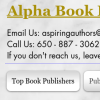-
About
- About Listly
- Community & Support
- Howto
- Chrome Extension
- Bookmarklet
- WordPress Plugin
- Listly Premium
- Privacy
- Terms
- DMCA Copyright
- © 2010-2024 Boomy Labs

 Alpha Book Publisher
Alpha Book Publisher
 Alpha Book Publisher
Alpha Book Publisher
 Alpha Book Publisher
Alpha Book Publisher
 Alpha Book Publisher
Alpha Book Publisher
Listly by Alpha Book Publisher
Real Publishing FAQ: Your Essential Guide to Answering Publishing Questions" provides a comprehensive resource for all your inquiries about the publishing world. From navigating the manuscript submission process to understanding royalties and marketing strategies, this guide covers everything aspiring authors need to know. Whether you're seeking advice on self-publishing or traditional publishing, we've got you covered with expert insights and practical tips to help you achieve your publishing goals. Join us as we demystify the world of publishing and empower writers to navigate their journey with confidence.Learn More: http://faq.realpublishing.site/FAQRealPublishing.html
Source: http://faq.realpublishing.site/FAQRealPublishing.html
The publishing process can vary depending on whether you're pursuing traditional publishing or self-publishing. For traditional publishing, it typically involves submitting your manuscript to literary agents or publishers, undergoing editorial revisions, and ultimately having your book published and distributed. Self-publishing allows authors to bypass traditional gatekeepers and take more control over the publishing process, but it also requires authors to handle aspects like editing, formatting, and marketing themselves.
Finding a literary agent can be a daunting task, but it's an essential step for authors seeking traditional publishing deals. Researching and querying agents who represent your genre is a good starting point. Personalizing your queries and following submission guidelines can help increase your chances of getting noticed. Networking at writing conferences and workshops can also provide opportunities to connect with agents.
Self-publishing offers authors greater creative control and faster time to market, but it also requires a significant investment of time, money, and effort. Authors are responsible for every aspect of the publishing process, from editing and design to marketing and distribution. While self-publishing can be empowering for some authors, it also means taking on the risks and responsibilities traditionally handled by publishers.
Marketing is an essential aspect of successful publishing, whether you're going the traditional route or self-publishing. Building an author platform, engaging with readers on social media, and securing reviews from bloggers and influencers are all effective marketing strategies. Collaborating with bookstores, libraries, and literary organizations can also help increase visibility and reach new audiences.
Making a living as an author is challenging, but not impossible. It often requires diversifying income streams beyond book sales, such as speaking engagements, teaching workshops, and freelance writing. Building a loyal readership, consistently producing quality work, and adapting to changes in the publishing industry are key factors in achieving long-term success as an author.
Royalties and advances are crucial aspects of the publishing process, especially for traditionally published authors. Royalties represent the percentage of book sales that authors receive as compensation, while advances are upfront payments from publishers against future royalties. Learn how these financial aspects work and what to expect when negotiating contracts with publishers.
Copyright and rights management are essential considerations for authors looking to protect their intellectual property and explore additional publishing opportunities. Learn about copyright basics, including how to register your work and understand your rights as an author. Discover the various rights you can license, such as translation rights, audio rights, and film rights, and how to manage them effectively.
The editorial process is a crucial stage in traditional publishing, where authors work closely with editors to refine their manuscripts and prepare them for publication. Learn about the different types of editing, from developmental editing to copyediting and proofreading, and understand how each stage contributes to the overall quality of your book. Discover tips for effectively working with editors and incorporating feedback to improve your writing.
There are various paths to publishing, each with its own advantages and challenges. In addition to traditional publishing and self-publishing, authors can explore hybrid publishing models and alternative publishing platforms. Learn about the pros and cons of each approach and how to choose the publishing path that best aligns with your goals and priorities as an author.
Building an author platform is essential for connecting with readers and promoting your work. However, it's important to diversify your platform beyond social media and author websites. Learn about alternative platforms such as podcasting, YouTube, and Patreon, and how they can help you reach new audiences and generate additional income as an author.

Alpha Book Publisher is a renowned publishing house that has been at the forefront of the literary world since the turn of the decade. The company has consistently delivered exceptional quality books across various genres, earning a stellar reputation for its commitment to excellence. With a talented team of editors, designers, and marketers, Alpha Book Publisher has provided a platform for both established and emerging authors. Their dedication to nurturing literary talent and promoting the joy of reading has made Alpha Book Publisher a trusted name in the publishing industry.